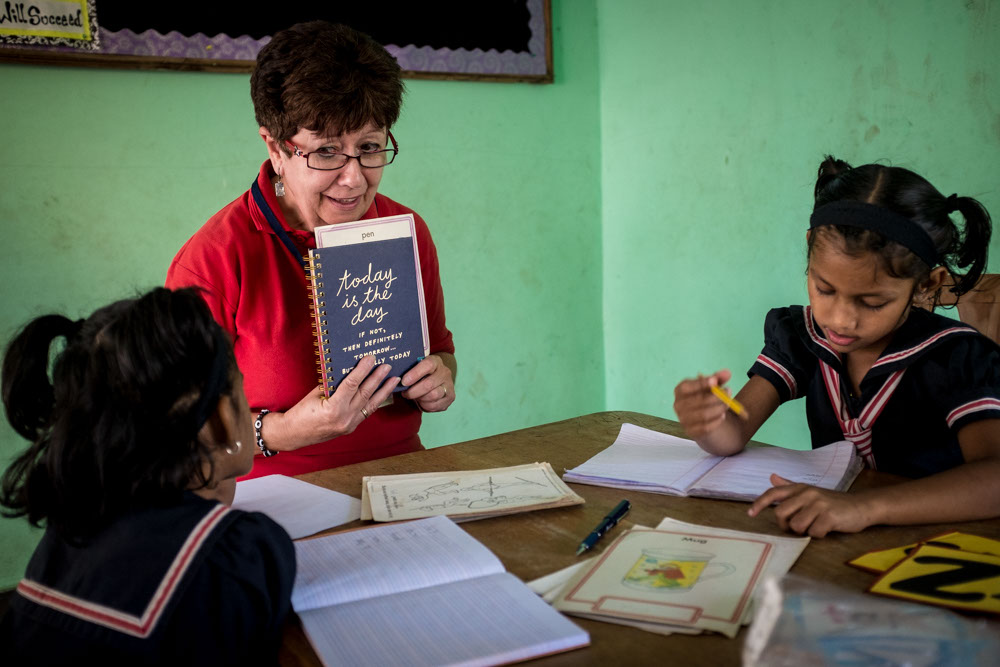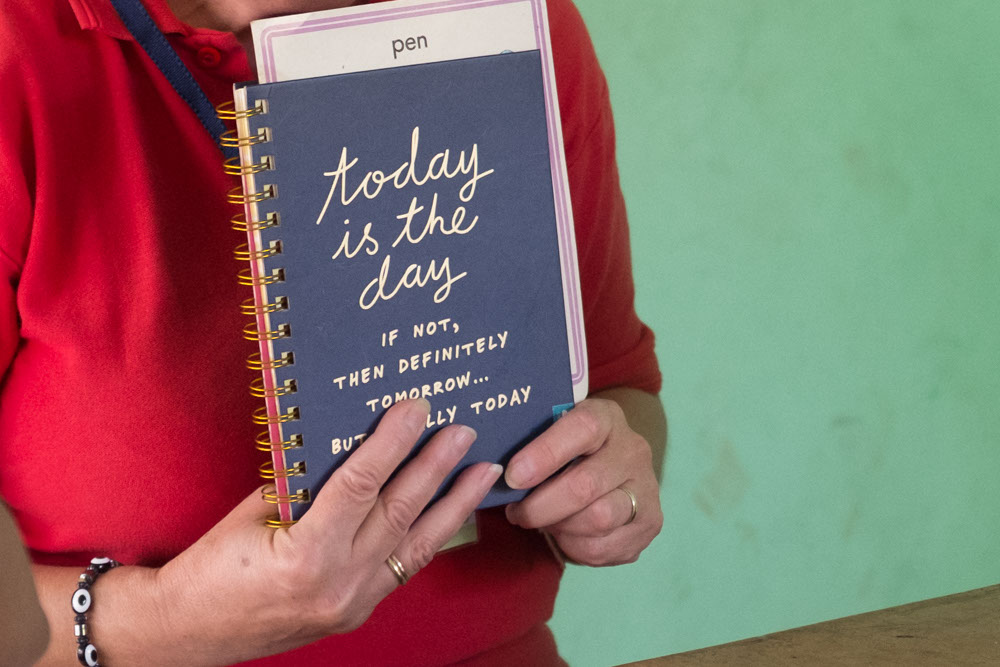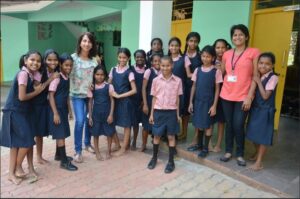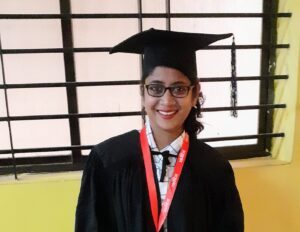Anita holds up a little white card before the two little girls sitting with her.
She leans forward and asks, “Can you tell me what’s this word?” Her voice is soft, her big eyes twinkling behind red-rimmed glasses. The little pony-tailed girl sitting before her is clueless.
“Archana,” Anita repeats, “I want you to look at the card carefully and read out the word for me. Will you do that?”
At this point, the second girl chimes in, “Ten!” she shouts.
“Ten! That’s good Divya,” says Anita.
All smiles, the seven-year-old triumphantly holds up her thumbs to Archana.
Anita, Archana and Divya sit around a little wooden desk in the main landing in the foyer of the Shanti Niketan school. Behind them, stairs lead to classrooms on the upper floors of this two-storied building. Painted on the wall are the words:
“In this school, we give second chances…”

Anita Bodle has spent twenty-three years as a teacher’s assistant in the UK, helping slow learners stay in the system. Today, sitting in the foyer of the Shanti Niketan school, she uses those skills in a setting very different from home.
From a classroom nearby comes the sound of children singing “Old McDonald had a farm…” to the accompaniment of a piano.
“Let’s play game!” shouts Archana, her face lit by a row of shiny little teeth behind a broad smile.
“Okay, game time,” says Anita.
The girls grab a little plastic bag holding four-by-six-inch handmade word cards: cow, at, in, bed, pig, leg, man in multiple colours.
Archana spreads the cards out on the table.
“Pick pig,” says Anita.
“Pig!” points Divya.
“Correct!” says Anita, “so you get to keep that card.”
The girls are now jumping in their seats. Archana is eager to pick the next word.
“Divya, why don’t you call a card for Archana?” says Anita.
“c—a—t” pronounces Divya slowly, dragging the sounds. “Cat?” she asks.
Colourful charts plaster the notice boards around the foyer. Painted on one are sunflowers with the words ‘honesty’, ‘caring’, ‘gratitude’. It could have been any school, anywhere. But the children here come from the streets and broken homes. Many are orphans or with parents unable to care for them, and nowhere to live.
El Shaddai Charitable Trust began with homes and shelters for these children. But taking the children off the streets and giving them a safe place to grow is just part of the mission. For a chance at a future, the children need a good education. For this, El Shaddai has set up the Shanti Niketan center for learning.
The school welcomes volunteers like Anita to help make in difference in the lives of these children. Anita and her husband first sponsored a child of El Shaddai fifteen years ago. Two years ago, she began helping in the school. Since then she’s been coming here for three months every year.
Anita’s mum migrated to England from Italy during the Second World War. “Mum brought me up to realise there are people worse off than us in the world,” she says. “We are so used to our own little worlds. I think, when you are a bit more privileged, it’s good to give something back. It’s really about just being there for the children,” she tells me.
“Can he play too?” Divya asks Anita, pointing towards me.
“Would you like to join us?” asks Anita.
“Sure!” I reply. To me, this was an invitation from Divya to join, not just her game, but her world.
“Archana, can you help me pick a word for this gentleman?” asks Anita. I’m ready for my word.
“If” shouts Divya.
“If?” I ask, “hmm, let me see.”
Divya is eager to help this poor chap. She bangs her little hand on the table: “IF!” she says, revealing the card.
“Oh! That one,” I say quietly, “Thank you. Perhaps it’s your card now.”
“No,” she replies, “You keep it. It’s yours.”
Anita says to me, “I tell some of my older students back home in London, I’d say: Do you know, I’ve been someplace where the children really want to study.
And they’d quip: Send them here, and we’ll go there.
“It’s funny,” she says, “I used to joke when I was little that when I grow up I want to be a missionary. I like to think all this time, I’m giving something.”
“Goa is a tourist spot, but I don’t come here every year for the beaches. I come here for the children. It’s challenging. But until you experience it, you don’t understand,” Anita concludes.

Archana is now scribbling something furiously in her book. Abruptly she lifts her head.
“Look! Anita!” she says, “Archana drawing” she points to the page. Little squiggles cover her notebook page.
She shuffles the cards on the table, tossing them about and laughs. It’s the sound of a gurgling stream. The music of a little child, happy with her childhood.
Then she points to the board behind Anita.
“Monday, Tuesday, Wednesday, Thursday, Friday, Saturday, Sunday,” she says reading from the board.
I look up at the board. It reads:
We trust in you, We believe in you…you are important, you will succeed.
I’ll concur any day of the week.


